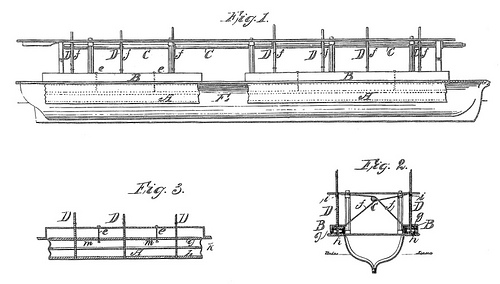- EPISCOPAL is an anagram of PEPSI COLA.
- Only a perfect square has an odd number of divisors.
- “Makes no sense makes no sense” makes no sense.
- The grounds of the Oklahoma state capitol include working oil rigs.
- “Time is the only critic without ambition.” — John Steinbeck
History
An Expansive Idea

While serving in Congress in 1848, Abe Lincoln conceived a way to help boats that became stranded on sandbars. If bellows were attached to a craft below the waterline, these could be inflated when it got stuck, buoying the craft and allowing it to float over the shoal.
Lincoln whittled a 20-inch model from a cigar box and a shingle. His law partner, W.H. Herndon, didn’t think much of it, but Lincoln presented it to lawyer Z.C. Robbins, who arranged a patent in 1849. This makes Lincoln the only president to hold a patent.
Apparently it never went to market, though. “Railroads soon diverted traffic from the rivers,” Robbins recalled, “and Lincoln got deep in law and politics, and I don’t think he ever received a dollar from it.”
Small Press
The first eyewitness account of the Wright brothers’ flying machine appeared in the journal Gleanings in Bee Culture.
The editor, beekeeper Amos I. Root, had visited the Wrights in 1904 at Huffman Prairie, Ohio, where they were working to perfect the machine after its historic first flight the preceding December.
Root sent copies of his article to Scientific American — but they were dismissed.
“Cross Purposes”

It was customary with Frederick the Great of Prussia, whenever a new soldier appeared in his guards, to ask him three questions–viz., ‘How old are you? How long have you been in my service? Are you satisfied with your pay and treatment?’ It happened that a young soldier, born in France, and who had served in his own country, desired to enlist into the Prussian service, and his figure was such as to cause him immediately to be accepted. He was totally ignorant of the German language, but his captain gave him notice that the King would question him in that language the first time he saw him, and therefore cautioned him to learn by heart the three answers he was to give. The soldier learned them by the next day, and as soon as he appeared in the ranks Frederick came up to interrogate him. His Majesty, however, happened to begin with the second question first, and asked him, ‘How long have you been in my service?’ ‘Twenty-one years,’ answered the soldier. The king, struck with his youth, which plainly indicated he had not borne a musket near so long as that, said to him, much astonished, ‘How old are you?’ ‘One year, an’t please your Majesty.’ Frederick, still more astonished, cried, ‘You or I must certainly be bereft of our senses.’ The soldier, who took this for the third question, replied firmly, ‘Both, an’t please your Majesty.’ ‘This is the first time I ever was treated as a madman at the head of my army,’ rejoined Frederick. The soldier, who had exhausted his stock of German, stood silent; and when the king again addressed him, in order to penetrate the mystery, the soldier told him in French that he did not understand a word of German. The king laughed heartily, and after exhorting him to perform his duty, left him.
— E. Shelton, ed., The Book of Battles, 1867
The Cleve Cartmill Affair
In 1943, writer Cleve Cartmill proposed a story about a futuristic bomb to John W. Campbell, the editor of Astounding Science Fiction. Campbell liked the idea and gave him some background material on fission devices and uranium-235.
The story, “Deadline,” ran in Campbell’s March 1944 issue — and shortly brought a visit from the FBI. Apparently the technical details in Cartmill’s story had some uncomfortable resonances with the top-secret Manhattan Project, then under way at Los Alamos:
Two cast-iron hemispheres, clamped over the orange segments of cadmium alloy. And the fuse–I see it is in–a tiny can of cadmium in a beryllium holder and a small explosive powerful enough to shatter the cadmium walls. Then–correct me if I’m wrong, will you?–the powdered uranium oxide runs together in the central cavity. The radium shoots neutrons into this mass–and the U-235 takes over from there. Right?
Campbell explained that he’d studied atomic physics at MIT and had drawn the research from unclassified journals. In the end the authorities were satisfied — but they asked him not to publish any more stories on nuclear technology.
See The War Ahead and Five Down.
Misc
- Georgia, Massachusetts, and Connecticut didn’t ratify the Bill of Rights until 1939.
- Wilt Chamberlain never fouled out of a game.
- 3864 = 3 × (-8 + 64)
- What’s the opposite of “not in”?
- Alaska has a longer coastline than all other U.S. states combined.
- “To do nothing is also a good remedy.” — Hippocrates
Inksmanship
In 1863, the register of the U.S. Treasury, L.E. Chittenden, had to sign 12,500 bonds in a single weekend to stop the delivery of two British-built warships to the Confederacy. He started at noon on Friday and managed 3,700 signatures in the first seven hours, but by Saturday morning he was desperate:
[E]very muscle on the right side connected with the movement of the hand and arm became inflamed, and the pain was almost beyond endurance. … In the slight pauses which were made, rubbing, the application of hot water, and other remedies were resorted to, in order to alleviate the pain and reduce the inflammation. They were comparatively ineffectual, and the hours dragged on without bringing much relief.
He finished, exhausted, at noon on Sunday, completing a mountain of bonds more than 6 feet high. These were rushed to a waiting steamer — and only then did word come that the English warships had been sold to a different buyer. The bonds, in the end, were not needed.
Fire Fight
In October 1962, during the Cuban Missile Crisis, a group of American destroyers trapped a Soviet submarine near Cuba. When the ships began dropping depth charges, the sub’s captain prepared to launch a nuclear-tipped torpedo, believing that a war between the superpowers might already be under way.
But the launch was permitted only if three officers agreed to it, and second-in-command Vasili Arkhipov held out against his superior. An argument ensued, but eventually he persuaded the captain to surface instead and seek orders from Moscow.
“The lesson from this,” remarked NSA director Thomas Blanton in 2002, “is that a guy called Vasili Arkhipov saved the world.”
See Close Call.
Domestic Harmony
The Musical World of London, Nov. 28, 1874, reports a surprising project — apparently a Massachusetts composer set the entire American constitution to music:
The authors of the Constitution of the Union thought more of reason than of rhyme, and their prose is not too well adapted to harmony, but the patriotic inspiration of Mr. Greeler, the Boston composer, overcomes every difficulty. He has made his score a genuine musical epopœia, and had it performed before a numerous public. The performance did not last less than six hours. The preamble of the Constitution forms a broad and majestic recitative, well sustained by altos and double basses. The first clause is written for a tenor; the other choruses are given to the bass, soprano, and baritone. The music of the clause treating of state’s rights is written in a minor key for bass and tenor. At the end of every clause, the recitative of the preamble is re-introduced and then repeated by the chorus. The constitutional amendments are treated as fugues and serve to introduce a formidable finale, in which the big drum and the gong play an important part. The general instrumentation is very scholarly, and the harmony surprising.
The music has been lost, but it would be out of date now anyway — we’ve added 12 amendments since then.
Comment
Dorothy Parker named her Boston terrier Woodrow Wilson “because he was full of shit.”
